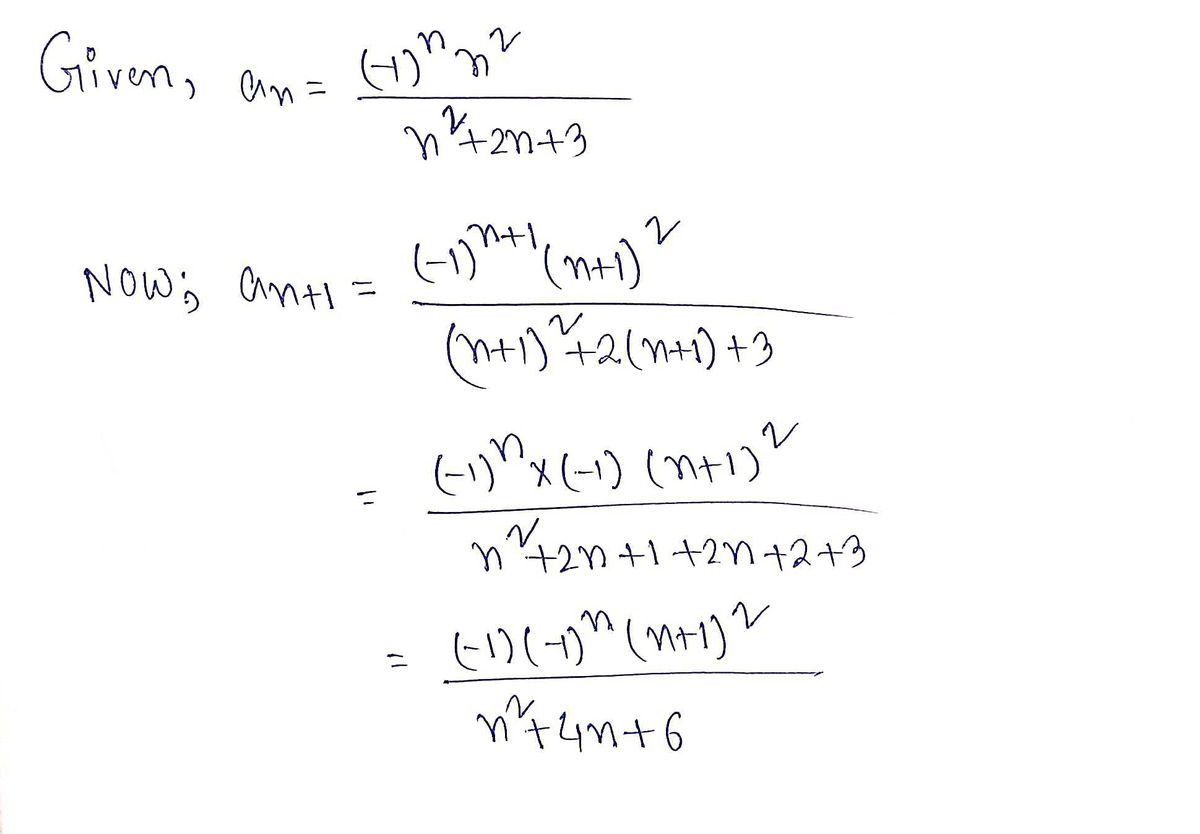Consider the series n=1 Compute an where an In this problem you must attempt to use the Ratio Test to decide whether the series converges. (-1)^n² n² + 2n + 3 an+1 L lim n->00 an Enter the numerical value of the limit L if it converges, INF if it diverges to infinity, -INF if it diverges to negative infinity, or DIV if it diverges but not to infinity or negative infinity. L =
Consider the series n=1 Compute an where an In this problem you must attempt to use the Ratio Test to decide whether the series converges. (-1)^n² n² + 2n + 3 an+1 L lim n->00 an Enter the numerical value of the limit L if it converges, INF if it diverges to infinity, -INF if it diverges to negative infinity, or DIV if it diverges but not to infinity or negative infinity. L =
Advanced Engineering Mathematics
10th Edition
ISBN:9780470458365
Author:Erwin Kreyszig
Publisher:Erwin Kreyszig
Chapter2: Second-order Linear Odes
Section: Chapter Questions
Problem 1RQ
Related questions
Question
I'm having issues setting these problems up. Can you assist me. I know what absoulte convergence and divergence is, but not the rest of the answers.

Transcribed Image Text:Consider the series
n=1
Compute
an where
In this problem you must attempt to use the Ratio Test to decide whether the series converges.
=
an
Which of the following statements is true?
A. The Ratio Test says that the series converges absolutely.
B. The Ratio Test says that the series diverges.
C. The Ratio Test says that the series converges conditionally.
(-1)^n²
n² + 2n + 3
L = lim
11-00
Enter the numerical value of the limit L if it converges, INF if it diverges to infinity, -INF if it diverges to negative infinity, or DIV if it diverges but not to infinity or negative infinity.
L =
D. The Ratio Test is inconclusive, but the series converges absolutely by another test or tests.
E. The Ratio Test is inconclusive, but the series diverges by another test or tests.
F. The Ratio Test is inconclusive, but the series converges conditionally by another test or tests.
Enter the letter for your choice here:
an+1
an
Expert Solution
Step 1

Trending now
This is a popular solution!
Step by step
Solved in 2 steps with 2 images

Recommended textbooks for you

Advanced Engineering Mathematics
Advanced Math
ISBN:
9780470458365
Author:
Erwin Kreyszig
Publisher:
Wiley, John & Sons, Incorporated

Numerical Methods for Engineers
Advanced Math
ISBN:
9780073397924
Author:
Steven C. Chapra Dr., Raymond P. Canale
Publisher:
McGraw-Hill Education

Introductory Mathematics for Engineering Applicat…
Advanced Math
ISBN:
9781118141809
Author:
Nathan Klingbeil
Publisher:
WILEY

Advanced Engineering Mathematics
Advanced Math
ISBN:
9780470458365
Author:
Erwin Kreyszig
Publisher:
Wiley, John & Sons, Incorporated

Numerical Methods for Engineers
Advanced Math
ISBN:
9780073397924
Author:
Steven C. Chapra Dr., Raymond P. Canale
Publisher:
McGraw-Hill Education

Introductory Mathematics for Engineering Applicat…
Advanced Math
ISBN:
9781118141809
Author:
Nathan Klingbeil
Publisher:
WILEY

Mathematics For Machine Technology
Advanced Math
ISBN:
9781337798310
Author:
Peterson, John.
Publisher:
Cengage Learning,

